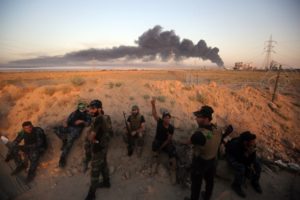by WorldTribune Staff, June 8, 2016
Iraq’s advance on Fallujah has been delayed by strategy disagreements among the nation’s splintered forces.
The Iraqi forces, having secured the southern edge of the city held by Islamic State of Iraq and Levant (ISIL), have been stalled for two days as commanders of elite counterterrorism special forces and government-sanctioned Shi’ite militias, known as the Popular Mobilization Forces, argue over battlefield tactics, analysts say.

“I wouldn’t say the different forces in the Fallujah operation are cooperating: They’ve just divided up the battlefield,” said Patrick Martin, an Iraq analyst with the Institute for the Study of War, a think tank based in Washington.
Meanwhile, the Iraqi Cabinet on June 7 sacked the nation’s intelligence chief Zuhair Al-Gharbawi and seven other officials, a cabinet source said.
Iraq’s U.S.-trained special forces have been tasked with entering Fallujah while the Popular Mobilization Forces have been restricted to securing the city’s outskirts. Both have their own command and control structure.
According to media reports, a single dispute brought operations to a halt on June 7.
The reports cited a disagreement over which forces should participate in the operation to clear Fallujah of ISIL jihadists before an advance into the city could begin. Some Shi’ite militiamen insisted on being part of the mission, said a senior Iraqi security official who spoke on condition of anonymity.
The Popular Mobilization Forces denied that, saying their fighters were ready to enter Fallujah if given the order but were standing down for now, said Hayder Mayahi, an official with the group’s media office.
The spokesman for the U.S.-led coalition downplayed any suggestion that the operation had stalled.
“Iraqi forces are positioning to move forward,” said Col. Christopher Garver. “These are things that happen on the battlefield,” he said, referring to the dispute over how the battle should progress.
According to an Associated Press report, the only evidence of an ongoing operation in Fallujah on June 7 was an occasional round of Iraqi artillery fired into the city. “By noon not a single coalition airstrike had been called in. A week earlier, coalition planes were averaging 25 to 30 strikes per day,” the report said.
Anbar province police force Maj. Ahmed Na’im said that while his men and the Iraqi federal police are fighting the same enemy in the same city, they never coordinate operations or share intelligence.
“They have their own plans and take their orders from their own people,” he said.
Aid groups continue to cite the deteriorating conditions for up to 50,000 civilians who remain in Fallujah.
“Another humanitarian tragedy is unfolding in Fallujah and the worst is yet to come,” said Bruno Geddo, the representative for the United Nation’s refugee agency in Iraq.
The UN human rights chief said there were “credible reports” that Iraqis fleeing Fallujah were facing physical abuse by armed groups backing Iraqi security forces.
In a June 7 statement from his office in Geneva, Zeid Ra’ad al-Hussein cited witness accounts that some men and teenage boys leaving Fallujah were detained with force that at times “degenerates” into abuse.
Zeid acknowledged that Iraqi forces have a “legitimate interest in vetting individuals fleeing ISIL-controlled areas” to make sure they don’t pose a security risk, but said those fleeing must be presumed to be civilians, barring “clear and cogent evidence to the contrary.”
In the firing of the country’s intel chief, a source, who spoke on condition of anonymity, told the Anadolu Agency: “The cabinet decided to remove Zuhair from his post as head of Iraq’s intelligence agency, along with state TV chief Mohamed Abdel-Gabbar.”
Al-Gharbawi will be replaced with Mustafa Kazmi, while Faisal Radi will temporarily take the place of Abdel-Gabbar, the source added.
